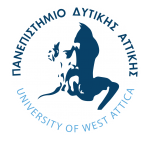Course info:
Semester: 3
General Foundation
ECTS: 6
Hours per week: 3
Professor: T.B.D.
Teaching style: Face to face
Grading: Homework (20%), Midterm written exam (30%), Final written exam (50%)
| Activity | Workload |
|---|---|
| Lectures | 36 |
| Class assignments | 30 |
| Independent study | 84 |
| Course total | 150 |
Learning Results
Upon successful completion of the course, students will:
- be familiar with the concepts of signals and systems
- know how to describe a signal mathematically, categorize signals and describe their properties in both continuous or discrete time
- understand the convolution operation and appreciate its importance in the analysis of LTI systems
- understand the relationship between time and frequency domains and appreciate the importance of Fourier analysis
- be familiar with the frequency response of a system
- know how to analyze analog signals using the DFT and FFT algorithms
- be able to represent digital systems using difference equations
- appreciate the importance of Z-transform for analyzing digital systems
- be able to design FIR/IIR digital systems and implement them on the computer
Skills acquired
- Data and information retrieval, analysis and synthesis
- Decision making
- Promotion of free, creative and inductive thinking
Introduction. Types of signals. Properties and characteristics of analog signals and systems. Linear Time-Invariant systems (LTI systems). Impulse response. Convolution. System representation: differential equations, block diagrams. Frequency domain analysis. Fourier series (line spectra). Fourier transform (spectral density). Frequency response. Digital signals and systems. Sampling theory. Impulse response of LTI digital systems. Linear convolution. Difference equations. Finite Impulse Response (FIR) systems. Infinite Impulse Response (IIR) systems. Discrete Fourier Transform (DFT). Analysis of analog signals using DFT. Circular convolution. The Fast Fourier Transform (FFT) algorithm. Z-transform. Design and implementation of digital systems. Correlation.
- Ziemer R. E., Tranter W. H., Fannin D. R., Signals and Systems: Continuous and Discrete, Pearson Education, 2014.
- Veloni A., Miridakis N., Boukouvala E., Digital and Statistical Signal Processing, 2018.
- Oppenheim A.V., Willsky A.S., Nawab S.H., Signals and Systems, Prentice Hall, 1996.
- Balmer L., Signals and Systems, Prentice Hall, 1997.
- Girod B., Rabenstein R., Stenger A., Signals and Systems, Wiley, 2001.
- Mitra S.K., Digital Signal Processing: A Computer-Based Approach, McGraw-Hill, 2000.
- Hsu H. P., Schaum’s Outline of Signals and Systems, 2010.
- Hayes M.H., Schaum’s Outline of Digital Signal Processing, McGraw-Hill, 1998.
- Haykin S., Van Veen B., Signals and Systems, John Wiley and Sons, 1999.
- Ingle V.K., Proakis J.G., Digital Signal Processing Using MATLAB, Brooks/Cole, 1999.
- Denbigh P., System Analysis & Signal Processing, Addison-Wesley, 1998.
- Rabiner L.R., Gold B., Theory and Application of Digital Signal Processing, Prentice-Hall, 1975.
- Papoulis A., Signal Analysis, McGraw-Hill, 1977.
- Learning Results - Skills acquired
-
Learning Results
Upon successful completion of the course, students will:
- be familiar with the concepts of signals and systems
- know how to describe a signal mathematically, categorize signals and describe their properties in both continuous or discrete time
- understand the convolution operation and appreciate its importance in the analysis of LTI systems
- understand the relationship between time and frequency domains and appreciate the importance of Fourier analysis
- be familiar with the frequency response of a system
- know how to analyze analog signals using the DFT and FFT algorithms
- be able to represent digital systems using difference equations
- appreciate the importance of Z-transform for analyzing digital systems
- be able to design FIR/IIR digital systems and implement them on the computer
Skills acquired
- Data and information retrieval, analysis and synthesis
- Decision making
- Promotion of free, creative and inductive thinking
- Course content
-
Introduction. Types of signals. Properties and characteristics of analog signals and systems. Linear Time-Invariant systems (LTI systems). Impulse response. Convolution. System representation: differential equations, block diagrams. Frequency domain analysis. Fourier series (line spectra). Fourier transform (spectral density). Frequency response. Digital signals and systems. Sampling theory. Impulse response of LTI digital systems. Linear convolution. Difference equations. Finite Impulse Response (FIR) systems. Infinite Impulse Response (IIR) systems. Discrete Fourier Transform (DFT). Analysis of analog signals using DFT. Circular convolution. The Fast Fourier Transform (FFT) algorithm. Z-transform. Design and implementation of digital systems. Correlation.
- Recommended bibliography
-
- Ziemer R. E., Tranter W. H., Fannin D. R., Signals and Systems: Continuous and Discrete, Pearson Education, 2014.
- Veloni A., Miridakis N., Boukouvala E., Digital and Statistical Signal Processing, 2018.
- Oppenheim A.V., Willsky A.S., Nawab S.H., Signals and Systems, Prentice Hall, 1996.
- Balmer L., Signals and Systems, Prentice Hall, 1997.
- Girod B., Rabenstein R., Stenger A., Signals and Systems, Wiley, 2001.
- Mitra S.K., Digital Signal Processing: A Computer-Based Approach, McGraw-Hill, 2000.
- Hsu H. P., Schaum’s Outline of Signals and Systems, 2010.
- Hayes M.H., Schaum’s Outline of Digital Signal Processing, McGraw-Hill, 1998.
- Haykin S., Van Veen B., Signals and Systems, John Wiley and Sons, 1999.
- Ingle V.K., Proakis J.G., Digital Signal Processing Using MATLAB, Brooks/Cole, 1999.
- Denbigh P., System Analysis & Signal Processing, Addison-Wesley, 1998.
- Rabiner L.R., Gold B., Theory and Application of Digital Signal Processing, Prentice-Hall, 1975.
- Papoulis A., Signal Analysis, McGraw-Hill, 1977.
